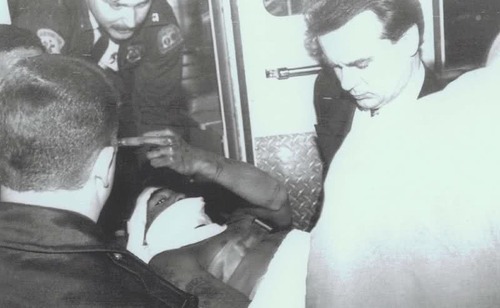Pop! Pop! Pop! "I could kill you now," a loud male voice said in the distance.
Our position on the hill behind our apartment shrouded us from the line of fire. I was frightened as shots crackled through the breeze of the early morning.
We lived in a bucolic suburban neighborhood nestled on Seattle's east side, and this was unusual, to say the least.
It was a hot June Saturday, and my daughter was in her bright blue parka with the hood on. It was an unusual decision among a series of questionable choices she had recently made.
Right before the shooting, I was concerned about the group walking by, pointing and laughing at her. However, it was now my responsibility to move us to safety.
As we ran with our dog to our doorway, I commanded: "Get down!"
Undetected by the shooter, my shaking hands struggled to open our front door. As we settled into a closet for safety while the ongoing gunfire continued. We sat holding our breath until we heard a car spin out of the complex.
Shell casings littered our driveway as I peered out the window for a glimpse. We dodged a bullet.
We were trembling. Nothing like this ever happened in our neighborhood. The most distressing incident occurred when a drunk driver had an accident on a local winding road at night.
My daughter, clearly shaken, refused to remove her parka. I gently asked her to remove it so she could cool down. She refused and continued to rock, saying: "Mama, I'm scared."
I shushed her and told her no one could get to us. I called the cops and waited for what would happen next. Detectives knocked on our door, and I shared what we witnessed.
This strange day brought the strangeness of our lives to full view.
My eleven-year-old daughter wore a blue parka year-round. She wouldn't take it off in 80-degree weather. Sweat drenched her, and her coat was filthy. Even though I couldn't comprehend it, something was amiss in our small world.
As her mother, I took her to doctor after doctor to figure out why she was having difficulty. I was aware of the statistic one-third of mental health conditions emerge before the age of 14 and half before the age of 18.
My daughter wouldn't attend school, and I had to push her out of the car during the morning drop-off. It seemed as though she was afraid of the building, but her friends or teachers didn't seem to be a factor.
I noticed dirt on her skin and asked if she bathed regularly. She responded yes. Her body odor was increasingly noticeable. Her hair was a matted mess; neither I nor my best friend, who's our hair stylist, could touch it. We gently brushed where we could so she wouldn't look so unhinged.
Her sudden reluctance to leave the house was concerning. I couldn't decide what steps to take next. She had a psychiatrist she adored who diagnosed her with major depressive disorder with psychosis.
But she stopped wanting to see him because she was overwhelmed with stress. He gave up on her for the time being, saying: "Please call back, Ms. Miles, when she's ready to speak to me."
I pulled the phone from my ear and was stunned. She had no access to medication now and was getting more paranoid. And somewhat violent.
After the shooting, she wouldn't let me out of the house. She pushed her 95-pound frame against mine to get away from the door. She slapped my hands as I turned the doorknob. An eleven-year-old made me feel like a prisoner in my own home.
The reason I couldn't go grocery shopping was because she was afraid something dangerous might happen to me. She refused to leave the house, claiming "they were watching her." It was impossible to use reason with her.
We made a compromise; I'd order groceries online. She would allow me to walk the dog to our car and back while she watched from the living room window. We mapped a route that was simple for her to see.
I took my cell phone and talked to her during the entire walk. It was difficult to juggle a feisty chihuahua and an iPhone, but somehow, I made it work. Once home, we bolted the door and put a chair underneath the doorknob.
It was real life, Home Alone, but it made her feel safe.
The aftermath felled us; my daughter became hyper-vigilant—any sound was a threat to her and our family. She looked out of the window when she heard people walking or cars starting. I felt cornered, and my head pounded trying to come up with creative ways to get out of the house. We had to continue living life.
To survive this onslaught, I bottled up my emotions. There was no one I could talk to or felt safe with. It would be an understatement to say that I was exhausted.
I was depressed and anxious; I ate only cookies and downed soda all day. I worked 40 hours a week and then cared for my daughter and our chihuahua. Not only that, but I had no respite; my daughter (and the dog) stuck to me like glue. My privacy was obliterated.
Every morning, I gazed at my haggard face and continued to work tirelessly.

For a small window of time, I thought things were getting better, but a new symptom arose. My daughter experienced depersonalization. She would awaken and sit in the living room, gazing blankly. Her eyes were lifeless and fixed on nothing.
I spent hours trying to get her grounded in the here and now. I continued to work with her while simultaneously taking multiple conference calls. My work was deteriorating, and my manager expressed growing concern about my dedication to the job. I was asked to take a personal leave of absence, but I couldn't afford it.
Suddenly the dam burst, and life cracked me open. I couldn't bear another moment with my child. I sat in bed, crying uncontrollably, unsure of what else to do. Work waited for eight days so I could get back on track. Kari, a close friend, suggested I call my therapist. With her help, I found a measure of peace.
The shooting exposed the rapid changes in our lives. She was now seeing phantom objects around the house, such as furry slugs in my closet, orbs of light near windows, and shadow figures as she drifted off to sleep. At one point, she told me she was Jesus. Google told me this was schizophrenia, but it was too early and too rare for her age.
We discovered a program specifically designed for children her age experiencing their first episode of psychosis. I went through the first virtual appointment with my daughter by my side. She was too afraid to speak, so I shared her story.
They were leery of us because my daughter wouldn't show herself on screen. This was after telling them she thought the computer camera was trying to kill her. Even with that hiccup we reached a consensus that she needed them.
The program was effective for a brief period, but the outcome remained unchanged: A refusal to participate. I knew we needed more.
I called our psychiatrist again, and he was open to seeing her. Hallelujah. This was the best news I had in a while; she loved this provider and would hopefully open up again. We met with him, and she started to blossom. We swiftly left the other program.
Slowly she started sharing more about her world with her beloved doctor. He was able to piece together the hallucinations and delusions and their new intensity. After a few sessions, he called me with some news.
"Hello, Ms. Miles, I'd like to tell you first. I'm now diagnosing your daughter with schizophrenia." My breath stopped; the room spun. But my voice broke: "Continue."
"Well, it has taken a while, as she's so young; she could have grown out of a lot of symptoms but didn't."
"Doctor, what does this mean for her?"
"It means, Ms. Miles, we'll put her on a course of antipsychotics and other drugs to get her as close to normal as possible."
We finally knew what we were fighting. I felt happy, sad, and sick all at the same time. Like a cancer patient, having knowledge is preferable to uncertainty.
We scheduled an appointment for later in the week to inform my daughter. During the appointment, she cried. She screamed: "I don't want schizophrenia." I responded that I didn't want schizophrenia either, but that's the situation we find ourselves in.
Her doctor and I soothed her, and she regained her calm. We left with prescriptions in hand, and we administered her first dose that evening.
It took a month or so, but the paranoia and stress slowed. The hallucinations eased up, and the voices were quieter. Summer was ending, and now it was time for middle school. We purchased new clothes from Hot Topic and Nordstrom Rack.
She was ready to take flight.
The first day of school, I drove her close to the new bus stop. She was sporting a fresh haircut, new jeans, and Doc Martens ready to take on 6th grade. She left her parka in her closet, but she didn't need it, as she was confidently embarking on her journey.
We deserved a break after the summer we'd had. The future looked bright in morning's light as I gazed through my shades.
Brittany Miles is a mental health advocate and opinion writer published in Business Insider, The Seattle Times, NAMI blog, and more. Her writing can be found at morethanguardians.com.
All views expressed are the author's own.
Do you have a unique experience or personal story to share? See our Reader Submissions Guide and then email the My Turn team at myturn@newsweek.com.




















 English (US) ·
English (US) ·